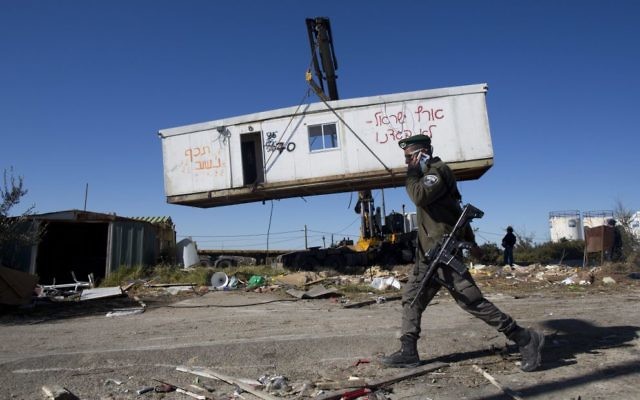New settlement law slammed as ‘theft’
Politicians have passed one of the most controversial laws ever brought before the Knesset, leaving some Israelis celebrating a victory for the settlement movement and others decrying the legalisation of “land grabs”.

Politicians have passed one of the most controversial laws ever brought before the Knesset, leaving some Israelis celebrating a victory for the settlement movement and others decrying the legalisation of “land grabs”.
The law passed on Monday is meant to prevent further outpost evacuations, like the one seen at Amona last week, by empowering the state to legalise West Bank construction that has taken place on privately owned Palestinian land. According to the legislation, even if Palestinian landowners don’t want to sell, they will be compensated and settlers will be allowed to stay on their land.
The law doesn’t allow new building on privately owned land, but is meant to stop thousands of homes that have already been built from being evacuated.
Opposition Leader Isaac Herzog says that new outpost legislation will land Israel in the dock of the International Criminal Court. Moments before the vote, he had urged politicians to “stop this train of horror before it leaves here and will only stop at The Hague”. Staying with the train analogy, he said that the carriages “will carry international indictments against Israeli and Jewish soldiers and officers”.
Yair Lapid of the Yesh Atid party called the law “unjust”, and claimed that it will harm Israel’s standing internationally, while the Peace Now lobby group said that it “makes theft an official Israeli policy and stains the Israeli law books”. Another activist group, B’Tselem, said that the law gives -legitimacy to “plunder” and constitutes “a disgrace for the state and its -legislature”.
Coalition politicians were triumphant. “The argument tonight is about who this land belongs to and about our basic right to our land,” said Science Minister Ofir Akunis, who represents Likud. Moti Yogev of the Jewish Home party said: “A great thing has happened in Israel.” And his colleague Shuli Mualem said it was a “historic day with the approval of a historic law”.
The international reaction was swift and harsh. The law sets a “very dangerous precedent”, said UN envoy for the Middle East peace process Nickolay Mladenov, adding that it “crosses a very thick red line” towards annexation of the West Bank. Britain’s Prime Minister Theresa May hosted Benjamin Netanyahu in London just before the law was passed, and voiced her objections. May’s Minister for the Middle East Tobias Ellwood later condemned the law, saying that it “damages
Israel’s standing with its international partners” and jeopardises the two-state solution.
Washington didn’t take a stance, though the law is expected to come up for discussion when Benjamin Netanyahu goes there next week. Indications are that he may come in for a dressing down from US President Donald Trump.
Trump began his presidency with an apparent embrace of the settler movement but the administration has slightly hardened its stance towards Israel’s West Bank policies in recent days. Last week – after Israel announced that a new settlement would be established to replace Amona and after officials increased the count of new homes approved over the Green Line since Trump took office to 6000 – the White House issued a -statement.
It said that while existing settlements don’t prevent peace, new settlements could make it harder to achieve. It said: “While we don’t believe the existence of settlements is an impediment to peace, the construction of new settlements or the expansion of existing settlements beyond their current borders may not be helpful in achieving that goal.”
The new law started impacting decisions immediately. On Tuesday, Israel’s High Court demanded the removal of 17 homes in the unauthorised outpost of Tapuach West by June 2018, because they are constructed on privately owned land. Tapuach settlers are expected to fight the evacuations citing the new legislation, but they already made a gain, as the court rejected calls to remove all Tapuach West homes because of the new law.
The new law is expected to be challenged in the High Court. Attorney-General Avichai Mandelblit, who normally defends government legislation, has said that he won’t defend this law, and one Israeli television report even suggested that he may testify against the law. The chances that the law will be struck down by the court are thought to be high.
NATHAN JEFFAY

comments